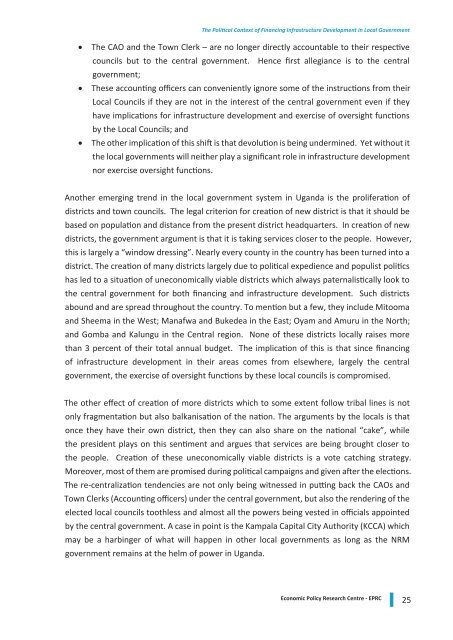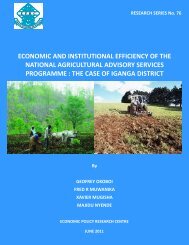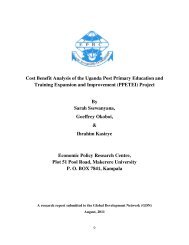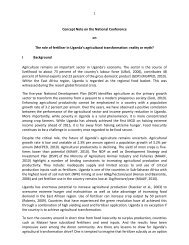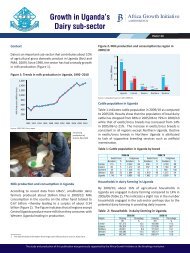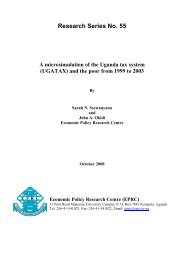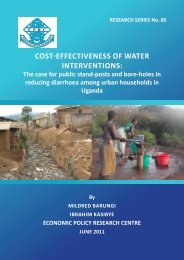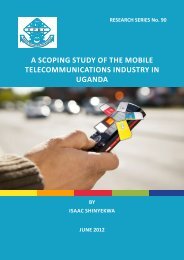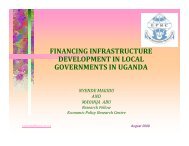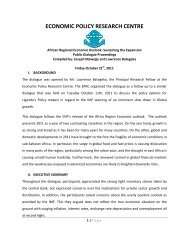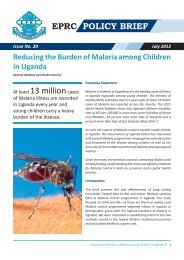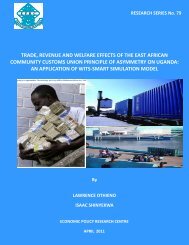The Political Context of Financing Infrastructure Development in ...
The Political Context of Financing Infrastructure Development in ...
The Political Context of Financing Infrastructure Development in ...
You also want an ePaper? Increase the reach of your titles
YUMPU automatically turns print PDFs into web optimized ePapers that Google loves.
<strong>The</strong> <strong>Political</strong> <strong>Context</strong> <strong>of</strong> <strong>F<strong>in</strong>anc<strong>in</strong>g</strong> <strong>Infrastructure</strong> <strong>Development</strong> <strong>in</strong> Local Government<br />
• <strong>The</strong> CAO and the Town Clerk – are no longer directly accountable to their respective<br />
councils but to the central government. Hence first allegiance is to the central<br />
government;<br />
• <strong>The</strong>se account<strong>in</strong>g <strong>of</strong>ficers can conveniently ignore some <strong>of</strong> the <strong>in</strong>structions from their<br />
Local Councils if they are not <strong>in</strong> the <strong>in</strong>terest <strong>of</strong> the central government even if they<br />
have implications for <strong>in</strong>frastructure development and exercise <strong>of</strong> oversight functions<br />
by the Local Councils; and<br />
• <strong>The</strong> other implication <strong>of</strong> this shift is that devolution is be<strong>in</strong>g underm<strong>in</strong>ed. Yet without it<br />
the local governments will neither play a significant role <strong>in</strong> <strong>in</strong>frastructure development<br />
nor exercise oversight functions.<br />
Another emerg<strong>in</strong>g trend <strong>in</strong> the local government system <strong>in</strong> Uganda is the proliferation <strong>of</strong><br />
districts and town councils. <strong>The</strong> legal criterion for creation <strong>of</strong> new district is that it should be<br />
based on population and distance from the present district headquarters. In creation <strong>of</strong> new<br />
districts, the government argument is that it is tak<strong>in</strong>g services closer to the people. However,<br />
this is largely a “w<strong>in</strong>dow dress<strong>in</strong>g”. Nearly every county <strong>in</strong> the country has been turned <strong>in</strong>to a<br />
district. <strong>The</strong> creation <strong>of</strong> many districts largely due to political expedience and populist politics<br />
has led to a situation <strong>of</strong> uneconomically viable districts which always paternalistically look to<br />
the central government for both f<strong>in</strong>anc<strong>in</strong>g and <strong>in</strong>frastructure development. Such districts<br />
abound and are spread throughout the country. To mention but a few, they <strong>in</strong>clude Mitooma<br />
and Sheema <strong>in</strong> the West; Manafwa and Bukedea <strong>in</strong> the East; Oyam and Amuru <strong>in</strong> the North;<br />
and Gomba and Kalungu <strong>in</strong> the Central region. None <strong>of</strong> these districts locally raises more<br />
than 3 percent <strong>of</strong> their total annual budget. <strong>The</strong> implication <strong>of</strong> this is that s<strong>in</strong>ce f<strong>in</strong>anc<strong>in</strong>g<br />
<strong>of</strong> <strong>in</strong>frastructure development <strong>in</strong> their areas comes from elsewhere, largely the central<br />
government, the exercise <strong>of</strong> oversight functions by these local councils is compromised.<br />
<strong>The</strong> other effect <strong>of</strong> creation <strong>of</strong> more districts which to some extent follow tribal l<strong>in</strong>es is not<br />
only fragmentation but also balkanisation <strong>of</strong> the nation. <strong>The</strong> arguments by the locals is that<br />
once they have their own district, then they can also share on the national “cake”, while<br />
the president plays on this sentiment and argues that services are be<strong>in</strong>g brought closer to<br />
the people. Creation <strong>of</strong> these uneconomically viable districts is a vote catch<strong>in</strong>g strategy.<br />
Moreover, most <strong>of</strong> them are promised dur<strong>in</strong>g political campaigns and given after the elections.<br />
<strong>The</strong> re-centralization tendencies are not only be<strong>in</strong>g witnessed <strong>in</strong> putt<strong>in</strong>g back the CAOs and<br />
Town Clerks (Account<strong>in</strong>g <strong>of</strong>ficers) under the central government, but also the render<strong>in</strong>g <strong>of</strong> the<br />
elected local councils toothless and almost all the powers be<strong>in</strong>g vested <strong>in</strong> <strong>of</strong>ficials appo<strong>in</strong>ted<br />
by the central government. A case <strong>in</strong> po<strong>in</strong>t is the Kampala Capital City Authority (KCCA) which<br />
may be a harb<strong>in</strong>ger <strong>of</strong> what will happen <strong>in</strong> other local governments as long as the NRM<br />
government rema<strong>in</strong>s at the helm <strong>of</strong> power <strong>in</strong> Uganda.<br />
Economic Policy Research Centre - EPRC<br />
25


